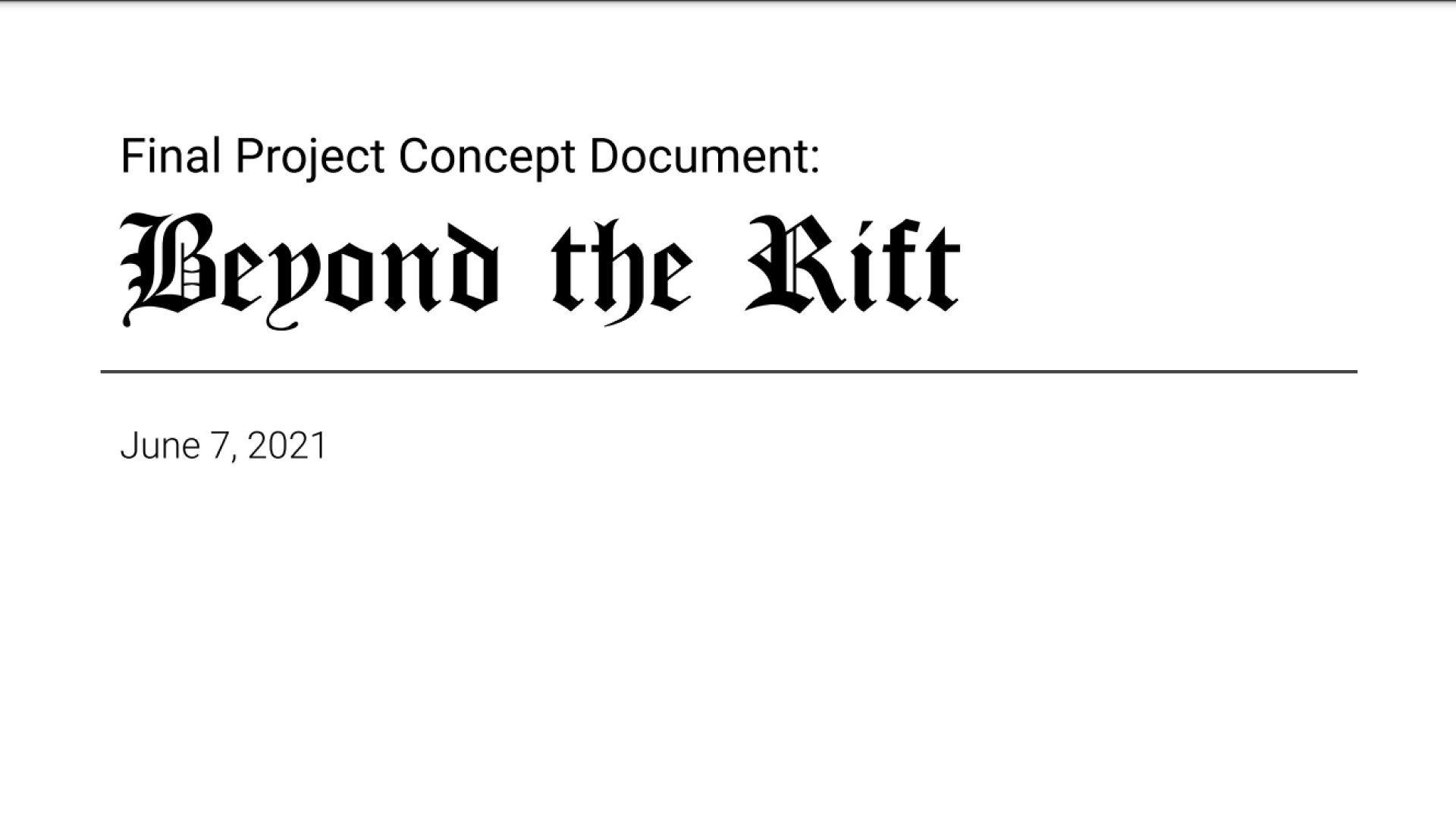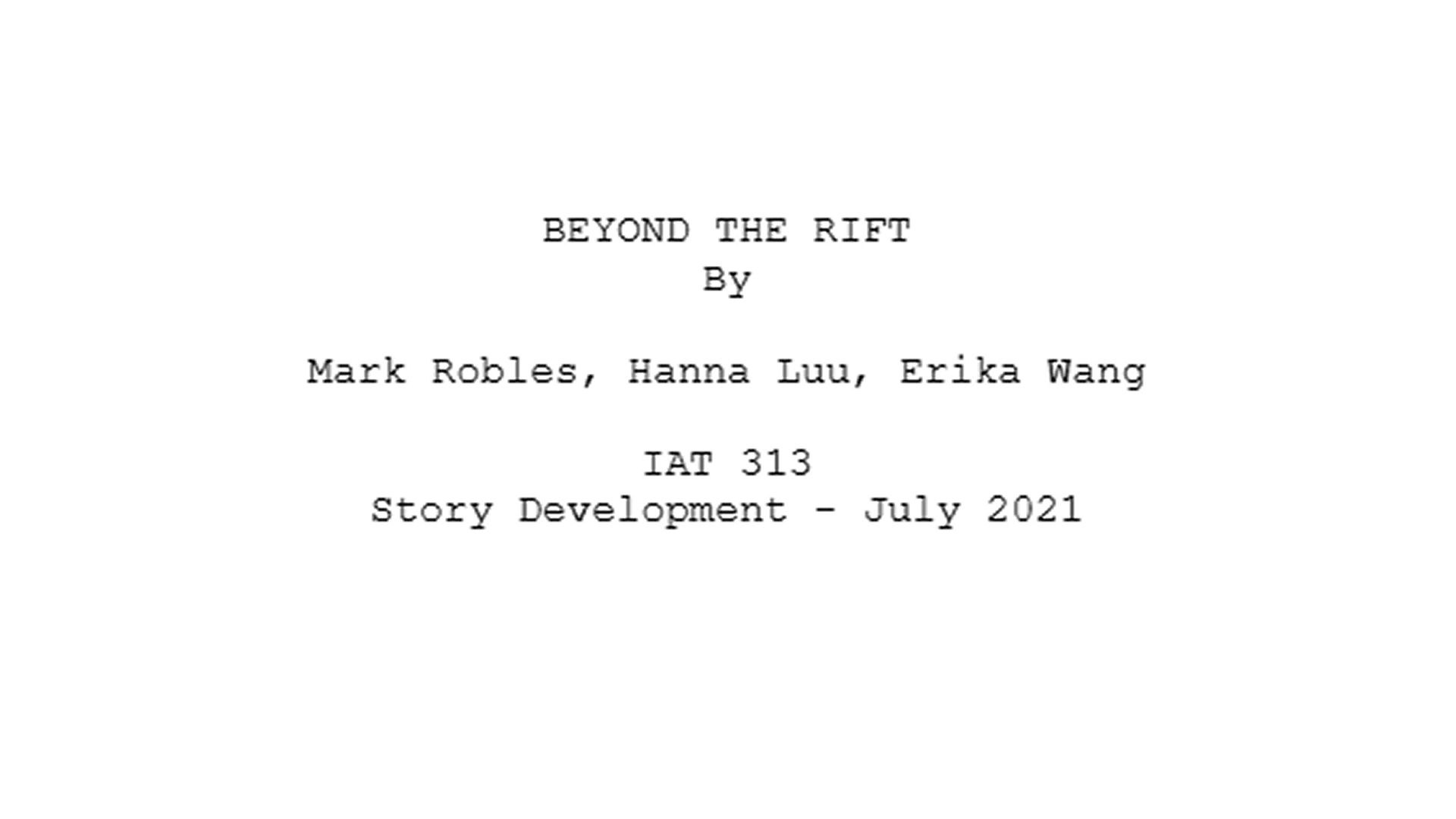Beyond The Rift.
Focuses on how the player's choices and skills can affect the outcome of the game's ending — with an emphasis on rich storytelling and alluring worldbuilding.
Download Beyond the Rift here.
Role
- Lead Game Designer
- Lead Narrative Designer
- Assistant Game Developer
Tools
- C#
- Unity
- Figma
Team
- Erika Wang - Artist
- Hanna Luu - Dev / Media
Date
July - August 2021
Project Overview.
Briefing & Gameplay Demo
The team was constrained to a two-week deadline to create a interactive narrative novel for a class called IAT 313: Narrative & New Media. The story must have branching endings, as well as outcomes which would be determined by the choices of the player. The team decided to develop the project in Unity due to our familiarity with the program and the fact that it gave us the versatility in implementing more complex narrative mechanics.
A good playthrough of the game showcasing the RP system and the combat.
Responsibilities.
Narrative Design & Implementation
Authored the script for Beyond the Rift and developed rich lore for each character, deepening the game's narrative foundation. Spearheaded the implementation of the narrative system using Unity's Fungus tool, crafting a dynamic RP system where player choices yield approval and unlock one of three distinct branching narrative endings.
Mini-Game & Combat Design
Spearheaded the design process for the game's mini-game and combat system, in which the difficulty is based on the player's RP level or choices made in the narrative.
Game Design Documentation
Created game design documentation detailing narrative design systems, combat systems, and art and sound design implementations. Documented playtesting sessions and feedback to enhance and define project goals.
Art & Sound Design Collaboration
Collaborated with art and sound design team members to define goals for the game's characters, environment, and UI art direction, as well as sound design intricacies for music, SFX, and VO. And surprise! I voice acted all playable and non-playable characters in the game.
Playtesting Iterations
Gathered players of different gaming backgrounds to conduct in-depth playtesting sessions on a bi-weekly basis and analyze moral choices and outcomes that players gravitated towards when playing with the RP system.
Development Assistance, Scripting
Assisted the development team with scripting combat behaviors for playable and non-playable characters using C# and Unity.
Gameplay Mechanics.
RP System
As such, players would lose or gain a certain amount of RP based on the dialogue choices they make, or their performance in the mini-games. The amount of RP is also determined by where the player is in the story; crucial decisions would either reap large accumulations or losses of RP.
Mini-Games
Mini-games are present in core parts of the story (3 to be precise), and serves the purpose of enabling the player to explore the extent of Bjorn's powers and how he uses them. The amount of RP will also affect particular mechanics of these mini-games, such as the timer when defeating enemies.
Combat
Combat is a prominent aspect of the mini-games. Although combat is not a core aspect of the overall game, a platformer mechanic is implemented. Bjorn can move laterally in a 2D environment while able to fend off enemies with his spells and teleport away from them to avoid damage.
Outcome
Incorporating the RP system into the dialogue choices and mini-games diversified the endings that players got in their playthroughs instead of constraining them to the ending that reflected the moral compass of their choices. Thus, replayability is encouraged.
Heroes and Villians.
Bjorn Ironhand
Known as the Demon of the Rift, Bjorn Ironhand is a warrior in-training who possesses space-time manipulation powers which enable him to teleport him and others anywhere in Wulfgard: the world in which the events of Beyond the Rift takes place.
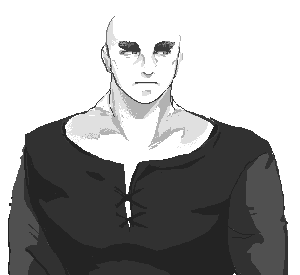
Khajiit D'Amelio
Khajiit D'Amelio is a retired Riftwalker who served under the tutelage of Thoros Ironhand, one of the legendary Riftwalkers of Wulfgard who was also Bjorn's uncle. Khajiit and Thoros were the key figures in stopping the the War of the Macrocosma, an event meant to bring about world-ending calamities — which was enacted by Bjorn's father, Mace Ironhand.
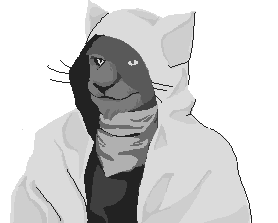
Malakai
A demonic entity that latched onto Bjorn in the womb when his mother, Rayla Ironhand, underwent the Trial of the Rifts. Malakai tends to harass Bjorn, attempting to corrupt his mind with vile thoughts. Malakai also greatly bolsters Bjorn's powers...only when he takes over.
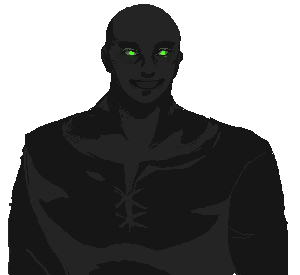
Rogue Riftwalkers
A band of Riftwalkers who departed from the original Riftwalker Guild due to conflicting ideals. They have assembled a new guild with the sole purpose of claiming any sources of power around Wulfgard to spread their influence.
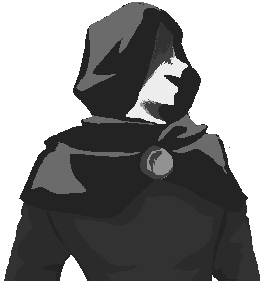
Mjoll D'Amelio
Mjoll D'Amelio is the adopted daughter of Khajiit. She was kidnapped by the Rogue Riftwalkers as a means to use her for their own malicious endeavors of world domination.
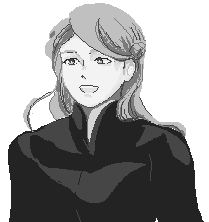
Lokir Ironhand
Bjorn Ironhand's eldest son. Are his powers hereditary, or is it only the absence of his hair follicles? This mystery remains unsolved for now, although Lokir has been displaying strange affinities to magic as of late...
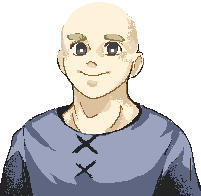
Design Challenges.
Problem
Initially, the dialogue choices were linear, wherein good, neutral, and bad options would result in an ending that reflected those choices. The team wanted another mechanic that would affect the outcome of the endings based on the player's decisions made throughout the game.
Solution
The RP System was implemented, wherein the choices of players would affect the approval rating of Khajiit D'Amelio, a core character. Players' decisions would either make them lose or gain RP; this would also affect the endings and other mechanics in the game such as the mini-games.
Playtesting Results.
01
Who were the playtesters?
The team gathered gathered individuals of various gaming experiences and ages as a means to investigate whether a broad demographic would be able to resonate with the narrative as well as whether they could quickly grasp the combat mechanics present in the mini-games.
02
Did players gravitate towards certain dialogue choices; a moral compass?
Players easily discerned whether choices were good, neutral, or evil. Although not inherently a flaw, many of the players gravitated towards good dialogue choices. Thus, I altered the dialogue in a way that did not make the moral compass of choices as obvious. Despite this, the consequences of the choices is still implied. This again, contributed to diverse playthroughs and choice selection.
03
Did players replay the game after their first playthrough to get other endings?
Players wanted to replay the game after their playthroughs to get the endings they did not experience, but the game did not provide them with a means to do so. That is to say that a replay button did not exist. The team quickly implemented a way for players to return to the main menu during the credits of the ending scene(s), thus facilitating replayability.
Worldbuilding.
Fleshing Out the Lore
Prior to this project, the team created a Machinima using The Elder Scrolls V: Skyrim that explores the lore and history of Beyond the Rift's universe. In essence, A Rift Awakening explains the backstories of crucial characters such as Khajiit D'Amelio and the Riftwalkers, and thus setting up the future events of Beyond the Rift.
Video edited by Hanna Luu; Machinima and voice acting done by me
"Please make a sequel."
- Christina Gonzalez (Re-Recording Mixer)
Reflection
It was a challenge for the team to create a game that was solely focused on branching narratives, as we had no experience them. With only two weeks to create one, we had to delegate roles to each member to play to their strengths. To achieve this, the team set up daily meetings to tackle particular goals of the development cycle.
One prominent challenge of this constraint was developing a fully-functioning dialogue system. As such, we utilized Fungus to save time, enabling us to focus on other aspects of the game such as the quality of the dialogue, the finesse of the art, and the combat mechanics of the mini-games. Each team member performed impeccably, and we delivered a game that reflects our love and passion for the craft.
